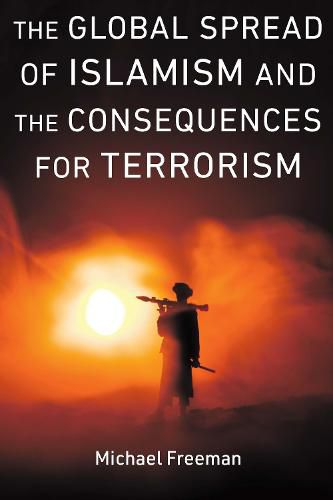Readings Newsletter
Become a Readings Member to make your shopping experience even easier.
Sign in or sign up for free!
You’re not far away from qualifying for FREE standard shipping within Australia
You’ve qualified for FREE standard shipping within Australia
The cart is loading…






The Global Spread of Islamism and the Consequences for Terrorism examines the causes of terrorism, and how potential causal factors have changed over time by looking at several key events of 1979. Terrorism motivated by Islamist religious ideology has been on the rise for the last forty years. Why? The three prior waves of terrorism - anarchist, nationalist, and Marxist - arose generally from a combination of geopolitical events and local grievances. This fourth wave of terrorism, however, has risen out of a different set of conditions. Existing analyses of terrorism often consider how terrorist ideologies have evolved or how grievances have changed over time. But these approaches miss what could be called the supply side of ideology - how state and nonstate actors have exported an ideology of Islamism and how this ideology has taken root beyond what grievances or ideological interpretations would predict. Michael Freeman connect the dots between several key events in 1979 - the hostage crisis at the Grand Mosque in Mecca, the Iranian Revolution, and the Soviet incursion into Afghanistan - and the incentives these events created for different actors to spread the supply of Islamism, the institutions they produced in various countries, and the terrorists who emerge from these institutions. In The Global Spread of Islamism and the Consequences for Terrorism Freeman examines four countries that have experienced this export of Islamism - Indonesia, Pakistan, the United Kingdom, and the United States - and briefly describes similar patterns in other countries. Understanding the importance of the supply side of Islamism helps us better understand the strength and staying power of this current wave of terrorism as well as opportunities to better counter it. AUTHORS: Michael Freeman is a professor in the Department of Defense Analysis at the Naval Postgraduate School in Monterey, California. He is the author of Freedom or Security: The Consequences for Democracies Using Emergency Powers to Fight Terror, the editor of Terror Financing: Case Studies, and the executive editor of the journal Combating Terrorism Exchange. Katherine Ellena is the senior global legal advisor for the International Foundation for Electoral Systems.
Amina Kator-Mubarez is a faculty associate at the Naval Postgraduate School for the Global ECCO (Education Community Collaboration Online) Project, sponsored by the Combatting Terrorism Irregular Warfare Fellowship Program under the Office of the Secretary of Defense.
$9.00 standard shipping within Australia
FREE standard shipping within Australia for orders over $100.00
Express & International shipping calculated at checkout
The Global Spread of Islamism and the Consequences for Terrorism examines the causes of terrorism, and how potential causal factors have changed over time by looking at several key events of 1979. Terrorism motivated by Islamist religious ideology has been on the rise for the last forty years. Why? The three prior waves of terrorism - anarchist, nationalist, and Marxist - arose generally from a combination of geopolitical events and local grievances. This fourth wave of terrorism, however, has risen out of a different set of conditions. Existing analyses of terrorism often consider how terrorist ideologies have evolved or how grievances have changed over time. But these approaches miss what could be called the supply side of ideology - how state and nonstate actors have exported an ideology of Islamism and how this ideology has taken root beyond what grievances or ideological interpretations would predict. Michael Freeman connect the dots between several key events in 1979 - the hostage crisis at the Grand Mosque in Mecca, the Iranian Revolution, and the Soviet incursion into Afghanistan - and the incentives these events created for different actors to spread the supply of Islamism, the institutions they produced in various countries, and the terrorists who emerge from these institutions. In The Global Spread of Islamism and the Consequences for Terrorism Freeman examines four countries that have experienced this export of Islamism - Indonesia, Pakistan, the United Kingdom, and the United States - and briefly describes similar patterns in other countries. Understanding the importance of the supply side of Islamism helps us better understand the strength and staying power of this current wave of terrorism as well as opportunities to better counter it. AUTHORS: Michael Freeman is a professor in the Department of Defense Analysis at the Naval Postgraduate School in Monterey, California. He is the author of Freedom or Security: The Consequences for Democracies Using Emergency Powers to Fight Terror, the editor of Terror Financing: Case Studies, and the executive editor of the journal Combating Terrorism Exchange. Katherine Ellena is the senior global legal advisor for the International Foundation for Electoral Systems.
Amina Kator-Mubarez is a faculty associate at the Naval Postgraduate School for the Global ECCO (Education Community Collaboration Online) Project, sponsored by the Combatting Terrorism Irregular Warfare Fellowship Program under the Office of the Secretary of Defense.